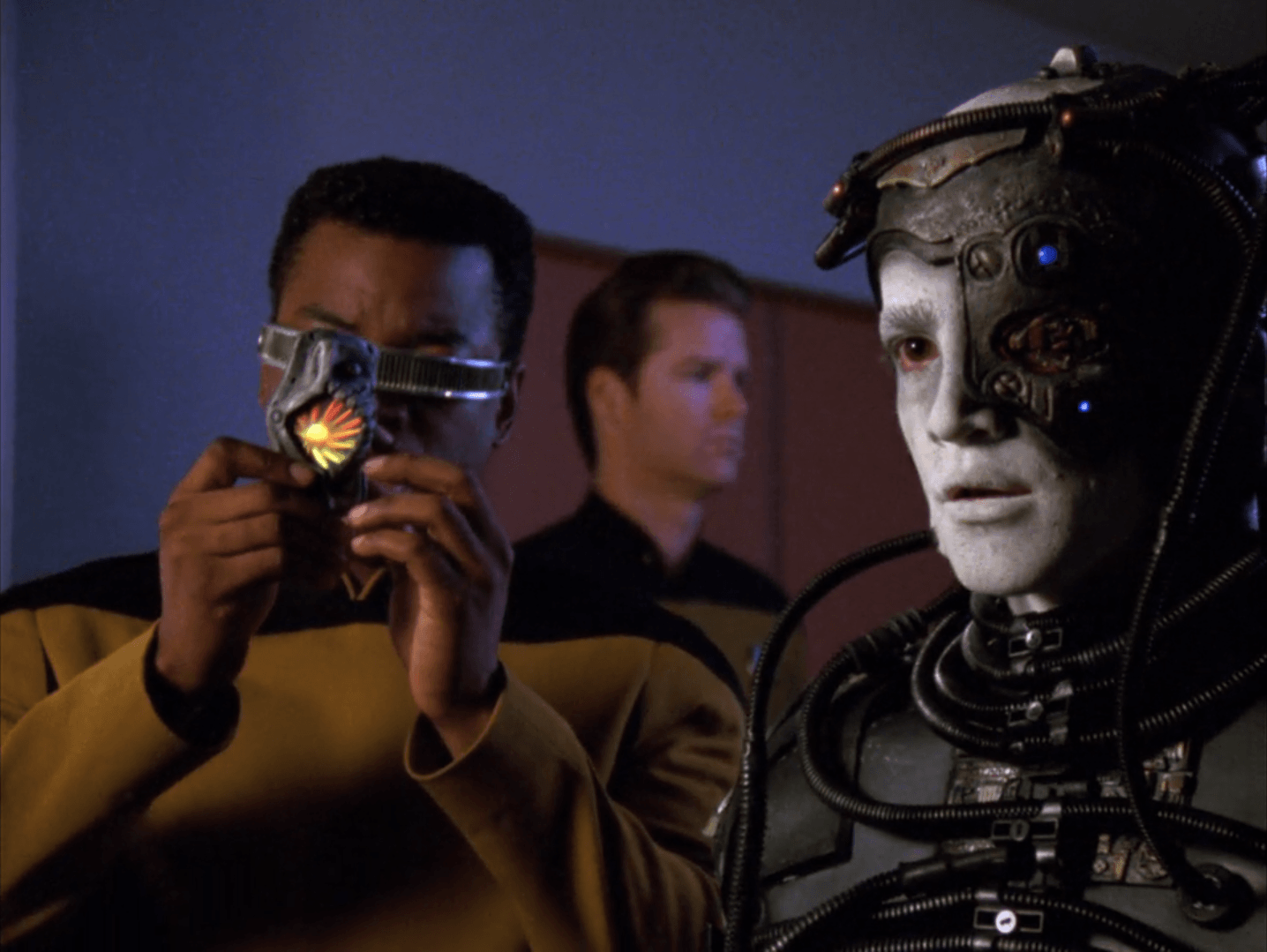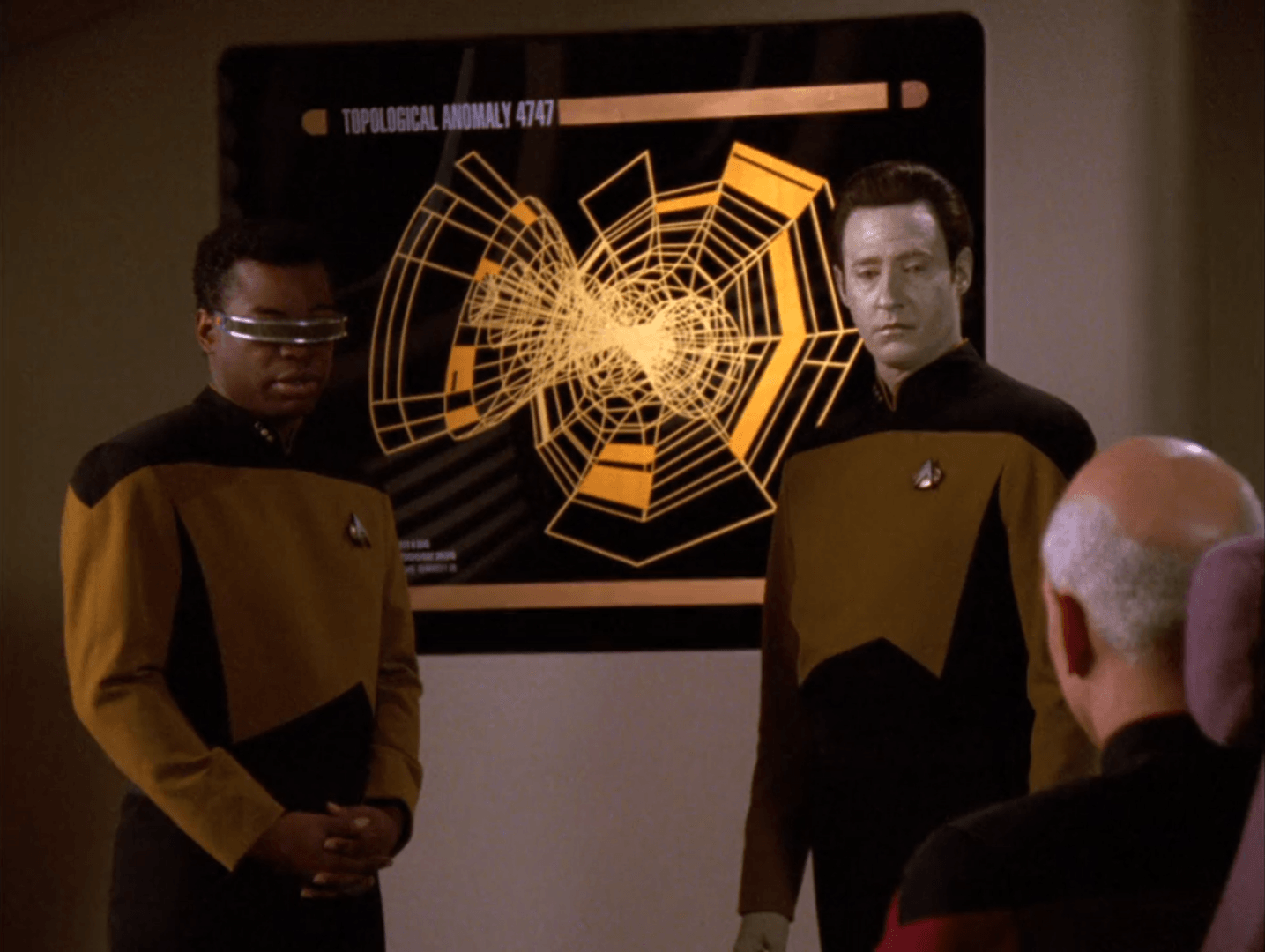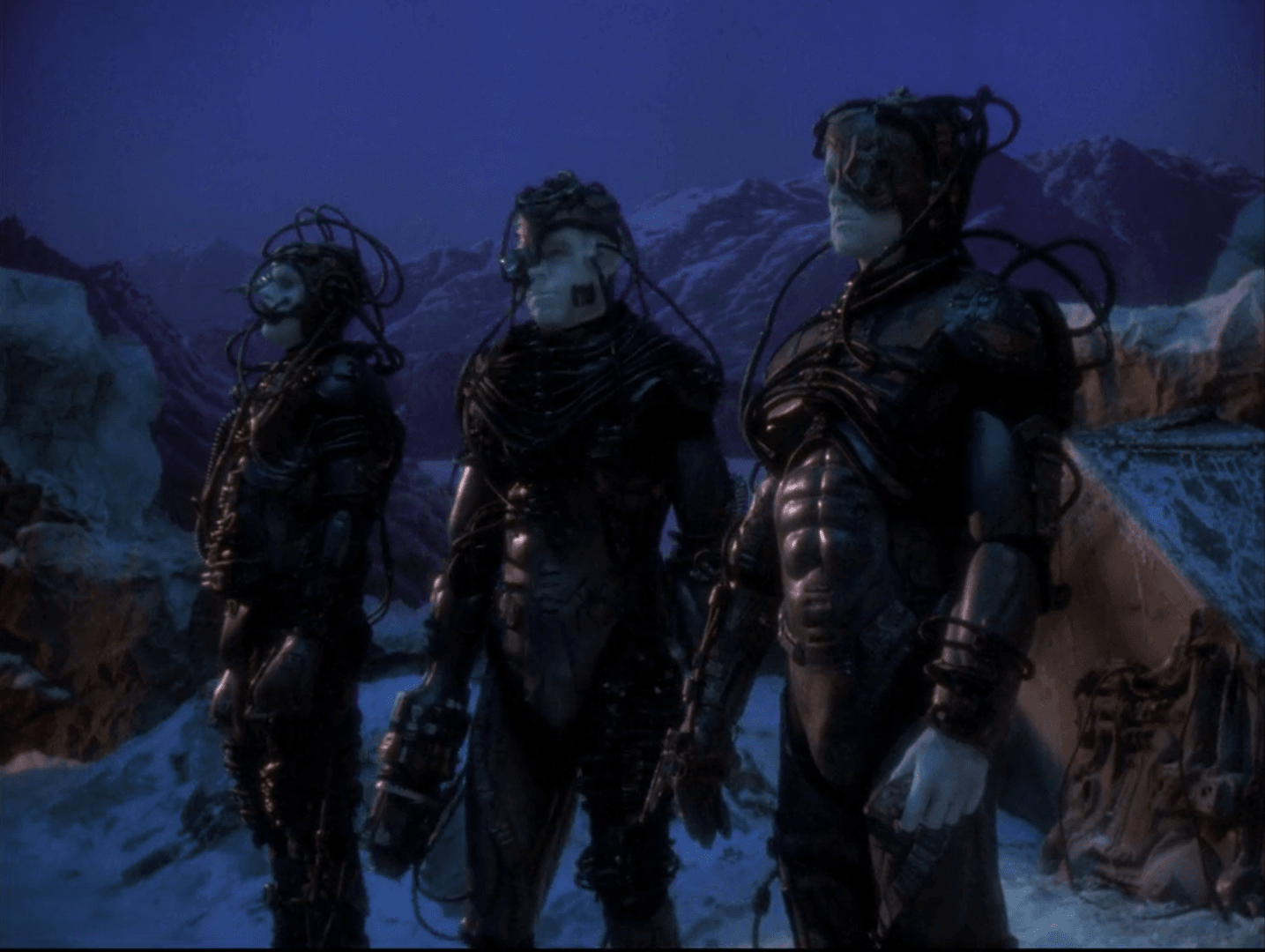As Borg episodes go, this is an interesting one. This is the third time we’ve seen the Borg and to this point, every time they’ve appeared has been a Big Deal. ‘Q Who’ introduced an awesome new threat, and ‘The Best of Both Worlds’ saw the Borg attack Earth and assimilate Captain Picard in what, I would argue, remains the strongest cliffhanger that ‘Star Trek’ (yes, the entire franchise) has to offer. But as I mentioned earlier, ‘I, Borg’ stands in contrast to those earlier episodes, instead presenting a smaller, more character-driven affair. In the finest ‘Star Trek’ tradition, this is an episode about getting to know your enemy as opposed to outrunning or outgunning him.
That character focus is two-pronged. The first of those, of course, is Hugh. As his grows into his renewed individuality, he puts an unlikely human face on the Borg, while also allowing the show to take it’s first real look at what it means to be a part of the Borg’s collective consciousness. These sorts of questions would be addressed in much greater depth on ‘Star Trek: Voyager’, particularly in the form of Seven of Nine, but this is the first time any of that subject matter would be dealt with.

In an unforgettable performance, Jonathan Del Arco imbues Hugh with what can only be described as a childlike innocence as he rediscovers his individuality and essentially becomes a full-fledged person before our eyes. It’s not entirely dissimilar to Data, which could at least partly account for the unlikely friendship he forms with LaForge. In fact, that friendship proves to be one of the most important parts of the episode (and certainly one of its most memorable), as it sends this Borg on, of all things, an emotional journey. All of this combines to present us with an impressively fully formed character, especially considering that this person (or the personality, at any rate) for all intents and purposes did not exist before the start of the episode.
The counterpoint to Hugh comes in the form of Picard and Guinan. Perhaps more than anyone else on the show, these are the characters we’d most expect to enter any given situation with compassion and understanding. So naturally, they’re the ones whose response to Hugh is shaped by vengeance-fueled prejudice. But while it might be the last thing we’d expect from these characters, it’s also completely understandable given their respective histories with the Borg. On the one hand, there’s Guinan. Her homeworld was destroyed and her people scattered throughout the galaxy as refugees following a Borg attack. And then, of course, there’s Picard. The last time he encountered the Borg, he was abducted, surgically altered, and rendered powerless to resist (You might even say it was futile. Sorry…) as his knowledge and experience were used to lead an attack that cost the lives of some eleven thousand Starfleet officers. So yes, it’s horrible, but it’s also hard to hold their antipathy against them.

Like Del Arco, Whoopi Goldberg and Patrick Stewart both bring their A-game to the episode, as does the often underappreciated LeVar Burton. There are any number of stand-out scenes in the episode. Among the most memorable are LaForge’s impassioned speech about individuality and the value of friendship, which culminates in his reaction when Hugh identifies their friendship as such, Guinan’s scenes with Picard – first chastising him for showing even a shred of sympathy for a Borg, and later pleading with him to actually look Hugh in the eye before using him to commit genocide – and Hugh’s confrontation with “Locutus,” in which his entire arc comes to a head. These are all wonderful scenes that I can playback in my mind even when I haven’t thought about or watched this episode in well over a year.
And now, it’s time to talk about genocide! Crusher rightly points out that this is exactly what they’re proposing as they embark on the plan to use Hugh to introduce an invasive program into the Collective. It’s a chilling moment, not only for what’s being discussed but for who, exactly, is discussing it. These are our heroes, after all. And more than that, they’re Starfleet officers. Even before Gene Roddenberry’s death (which came early in the fifth season of ‘TNG’ – likely around the time the ‘I, Borg’ was being developed), his gradual loss of control over the broader ‘Star Trek’ franchise has lead fans to decry any production or plot development they don’t care for by asserting that “Roddenberry would have hated it.” Be honest with yourself, we’ve all done it. And this has been the case about everything from ‘Wrath of Khan’ (of which Roddenberry was, in fact, publicly critical) to ‘Discovery’, and I’m sure it will continue to happen for as long as there are opinionated ‘Trek’ fans to be found. But in this case? Yeah, Captain Picard and his senior staff contemplate genocide. It’s hard to imagine the Great Bird would have taken that one lying down.

It’s also a reminder that ‘Star Trek’ has a longer history of flirting with that sort of thing that most of us would like to remember, particularly those of us (myself included) who were uncomfortable with Starfleet’s complicity in the near-genocide of “Operation: Blow Up Qo’nos” late in the first season of ‘Star Trek: Discovery’. Just off the top of my head, there’s ‘I, Borg’ and Section 31’s attempt to win the Dominion War by exterminating the Founders (season seven of ‘Deep Space Nine’). We might even count the neurolytic pathogen that Future Janeway introduced into the Borg’s collective consciousness in ‘Endgame’, but given that we haven’t properly seen the Borg since (that ill-advised ‘Enterprise’ was, of course, a prequel involving a small group of drones that originated some years prior to the ‘Voyager’ finale), we can’t really talk about that with any sort of certainty. But nonetheless. We don’t have to like it, but this sort of thing far from new to the franchise.
I should note that the downside of stories like this is that by fleshing out a monolithic, overwhelming foe like the Borg, you run the risk of making them a little too familiar, of letting the audience get to know them a little too well. It goes back to what I mentioned earlier about the Borg’s purported overexposure on ‘Voyager’. The more you see a villain, the more you get to know them. The more you get to know them, the less mysterious they become, and before you know it, the great, terrifying unknown is familiar and mundane. It’s Tuesday. Just look at what happened (and much more quickly, I must say) with the Weeping Angels over on ‘Doctor Who’. As terrifying as their first appearance was, their most recent was entirely forgettable. And it could be argued that ‘I, Borg’ opened the Borg up to exactly that sort of threat erosion. But you can’t blame this episode (or any other) for the ways in which different writers years down the road would eventually explore the ideas it introduced. On its own merits, ‘I, Borg’ is just damn good ‘Trek’.
What do you think of ‘I, Borg’? Let us know in the comments and be sure to check back in two weeks, when ‘Final Frontier Friday’ goes to the movies…
